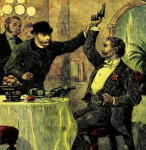
 People tend to think of boycotts as classic non-violent direct action. Power to the people! and so on. Often, in recent years, boycotts have been used by consumers to pressure companies on a range of progressive issues, such as gun control and marriage equality.
People tend to think of boycotts as classic non-violent direct action. Power to the people! and so on. Often, in recent years, boycotts have been used by consumers to pressure companies on a range of progressive issues, such as gun control and marriage equality.
But of course, boycotts have not always been a progressive thing — they’re used by activists on all parts of the political spectrum. And historically, they’ve sometimes been used for some rather nasty purposes. In the 1920s, for example, the Ku Klux Klan quite openly used boycotts to drive Black-owned stores (along with stores owned by Jews and Catholics) out of business. This was a strategy aimed ultimately at driving out entire minority populations out of particular towns and states.
Kathleen Blee, in her book Women of the Klan: Racism and Gender in the 1920s, notes with apparent surprise that among the informants (former Klan members) she interviewed, “None saw [such use of economic power] as an act of violence.” Linda Gordon, in her own book, The Second Coming of the KKK: The Ku Klux Klan of the 1920s and the American Political Tradition, cites Blee on this point. Both authors, seem to find this remarkable, implying that they (these authors) do see Klan boycotts as a form of violence. I’m tempted to agree with them.
But wait, shouldn’t we distinguish boycotts from the genuinely violent behaviours engaged in by the KKK? Isn’t “violence” here just a metaphor?
Maybe. But it’s worth noting that economic harms are genuine harms. Economic losses can mean the inability to eat, or to feed your family. The owner and employees of a Catholic-owned business in a small town in Indiana in the 1920s might have suffered very real hardship if the Klan convinced a sufficient proportion of the town’s population not to shop there, as they sometimes did. I suspect many people would, if pressed, prefer to suffer some measure of literal, physical violence (a black eye? a moderate beating? a few broken windows?) to the kind of economic loss such boycotts implied. Economic harms are meaningful.
Granted, not all cases are so dramatic: when Democrats in the US boycotted In-N-Out Burger in 2018 for donating to the Republican party, it was highly unlikely that In-N-Out was going to be driven out of business. Real economic damage (of a kind we might think of as akin to violence) was highly unlikely.
The goals of the In-N-Out boycott (and others like it) were different, too. No one really wanted to harm In-N-Out — applying economic pressure was a mere tool. The goal was more likely symbolic, or at most aimed at producing enough economic pain to get In-N-Out to reconsider its approach to political donations. But then, boycotts were arguably a ‘mere tool’ for the KKK, too. They arguably had nothing against boycotted businesses, themselves, but used boycotts to exert economic pressure intended to get the proprietor-owners to leave town. Killing the business wasn’t the point. Getting rid of ‘the wrong sorts of people was the point.
Another possible difference: the KKK had shown itself fully willing to engage in physical violence. So there was always the knowledge that if the boycott didn’t work, things could end going in a different direction. Once violence is on the table, so to speak, then every other tactic being used is suffused with violent potential. There was no indication in 2018 that Democrats were going to turn violent to augment the force of their boycott, or that things would get physically violent if In-N-Out didn’t give in. So in that sense, the 2018 boycott was more clearly non-violent than the KKK boycotts of the 1920s.
Still, the question does give pause. Boycotts do occupy part of a spectrum of direct-action activities, understood as extra-legal activities designed to change someone’s behaviour. They are attempts to go beyond rational persuasion to take matters into one’s own hands, to force an outcome that one is unable or unwilling to argue for. Of course, that’s probably sometimes morally required. But it’s not to be taken lightly.

